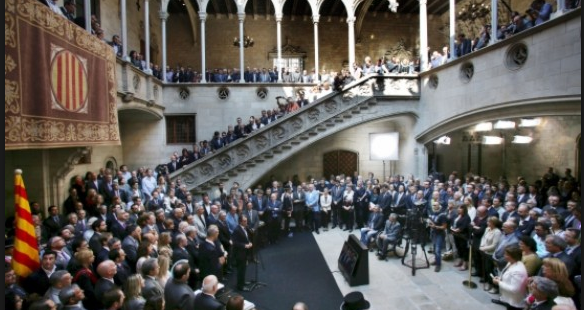14.09.2017 - 17:05
|
Actualització: 14.09.2017 - 17:07
On Wednesday, the prosecutor ordered the investigation of the 712 Catalan mayors who have officially supported the Catalan referendum to be held on October 1. Local prosecutors’ offices will now decide whether they call the mayors in for questioning, but the prosecutor ordered that, in the event that they fail to appear on court, the Catalan police will have to arrest them and bring them in. Their top priority is investigating the most populated towns. These 712 mayors comprise around 75% of the 948 mayors who currently hold office in Catalonia. The referendum is planned to be held in 19 days, a tight period for such an investigation.
Spain’s police to amp up presence in Catalonia in the run-up to the vote
In its effort to stop the referendum, Spain not only mobilized its prosecutors offices, but also its police. Sources from the National Police corps said that it will increase the presence of riot control officers and other agents in Catalonia in the days leading up to the vote. Additionally, some agents’ vacation periods have been postponed in order that the corps be in full force during the coming weeks. Spain’s Guardia Civil officers association said that the corps is holding back 200 agents in Catalonia that had been destined to other locations.
Court suspends event supporting Catalan referendum in Madrid
A court in Madrid suspended an event to support the October 1 Catalan referendum in Spain’s capital to be held this Sunday. Madrid’s local government had allowed the host organization, Madrileños por el Derecho de Decidir (Madrid residents for the right to decide), to use a municipal site for the event. However, a local court ruled that the event cannot be held in a city-owned site on the grounds that the October 1 vote has been suspended by the Spanish Constitutional Court.
The organizers announced on Wednesday that the event will take place anyway this Sunday, but they will not use city premises. They claim that a referendum is a “basic democratic principle” and that they stand up for the Catalans’ right to self-determination. According to them, it is a “legitimate aspiration”.
Judge standing up against “Spain’s destruction”
The judge, José Yusty Bastarreche, took the decision after an appeal from the Madrid branch of the ruling People’s Party. “It is an exaltation of an illegal referendum,” said a party spokesperson. The decision was controversial, as it has been found that the judge had signed a manifesto created by an anti-Catalan-independence group in October 2014. The organization, called Libres e Iguales (Free and Equal), aims to mobilize “Spanish public opinion against Spain’s destruction.”
Yusty Bastarreche even wrote a post on the organization’s website, saying that he was available if he was needed to fulfill Libres e Iguales’ aims. “As a judge, I can’t take part in political parties’ events, but I can get involved in citizens organizations. Long live Spain!” Literature Nobel Prize laureate Mario Vargas Llosa and writer Jorge Martínez Reverte are two of the dignitaries who promoted the manifesto in 2014, a few months before the 2014 unofficial Catalan referendum.



